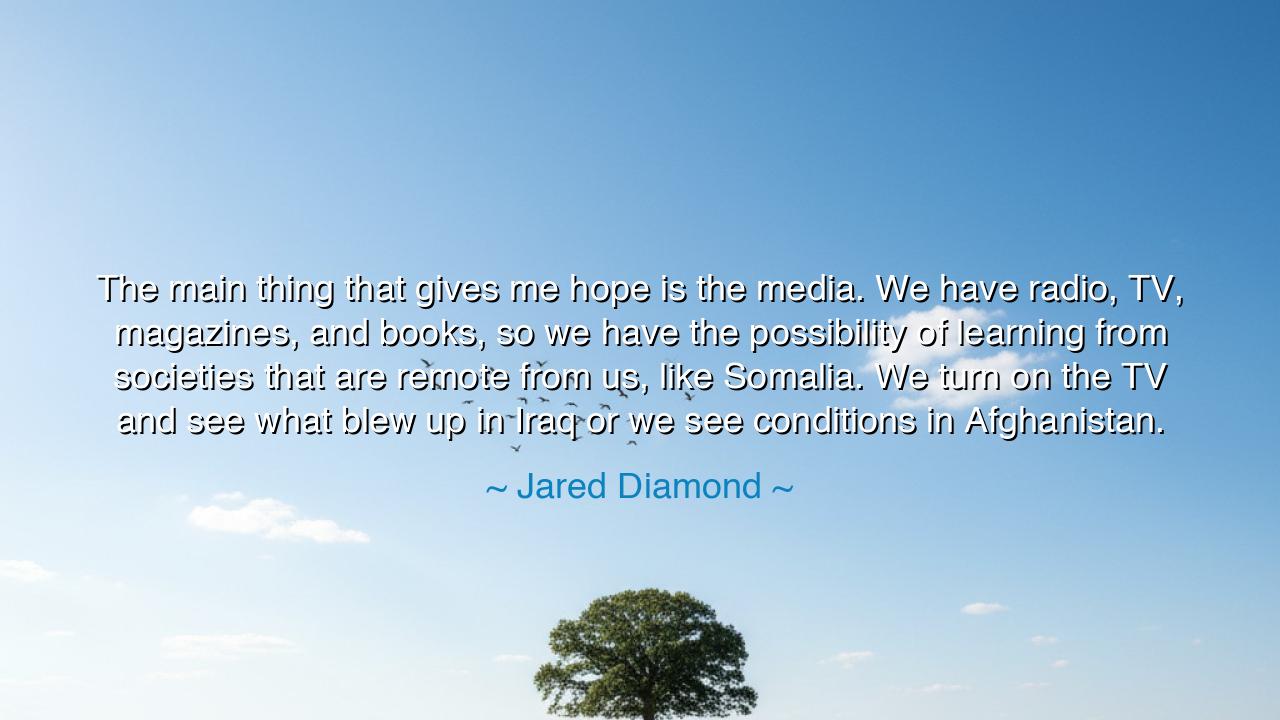
The main thing that gives me hope is the media. We have radio
The main thing that gives me hope is the media. We have radio, TV, magazines, and books, so we have the possibility of learning from societies that are remote from us, like Somalia. We turn on the TV and see what blew up in Iraq or we see conditions in Afghanistan.






Hear the voice of Jared Diamond, wise interpreter of civilizations, who proclaimed: “The main thing that gives me hope is the media. We have radio, TV, magazines, and books, so we have the possibility of learning from societies that are remote from us, like Somalia. We turn on the TV and see what blew up in Iraq or we see conditions in Afghanistan.” These words are not casual, but carry the weight of history, for they remind us that knowledge is the foundation of survival, and that through the channels of communication, humanity may learn not only from its triumphs, but also from its sorrows and failures.
Diamond speaks of the media as a vessel of hope. Where once societies fell into ruin, blind to the mistakes of others, now, through the voices of radio, the vision of television, the words of books, we may see far beyond our own borders. He names Somalia, Iraq, and Afghanistan, not as abstractions, but as living examples of the fragility of human societies—lands torn by war, famine, and conflict. In seeing them, he argues, we have the chance to learn, to avoid the same paths, to guard against the same errors. Hope arises not from ignorance, but from awareness.
The ancients, too, knew the peril of blindness. Consider the fall of Rome: as the empire decayed, many leaders ignored the lessons of collapsing provinces, repeating the same mistakes until the center itself fell. They lacked the media to see swiftly, to connect the threads, to recognize the warning signs. In contrast, our age, Diamond reminds us, has the gift of immediacy. A disaster in one land can become a lesson for another within hours. Knowledge, if heeded, can become the shield that preserves nations.
Yet he also acknowledges the harshness of what we see. “What blew up in Iraq,” he says, or “conditions in Afghanistan.” These images are not pleasant; they are often filled with grief, destruction, and despair. But here lies the deeper meaning: hope does not arise from ignoring pain, but from facing it. Just as a doctor learns from the suffering of patients to heal the next, so too must societies learn from the wounds of others to avoid their own collapse. The media, when it shows us suffering, is not only reporting tragedy—it is offering wisdom, if we have the humility to receive it.
Consider also the story of the Black Death in medieval Europe. News traveled slowly, and towns were struck one after another, ignorant of what had destroyed their neighbors. Had there been swifter means of communication, millions might have been spared. Today, however, pandemics, wars, and famines can be known across the globe in an instant. This swiftness is Diamond’s reason for hope: where ignorance once doomed entire peoples, knowledge now gives us a chance to prepare, to act, to survive.
The emotional essence of his words is gratitude mixed with warning. Gratitude, because never before has humanity possessed such tools for connection; warning, because possession of knowledge is not enough—it must be used. To see Somalia’s famine, Iraq’s bombs, Afghanistan’s struggles, and do nothing is to waste the gift of awareness. To see and to act, however, is to transform tragedy into teaching, sorrow into strength.
The lesson, O seeker of wisdom, is this: do not avert your eyes from the suffering of the world. Watch, read, listen, and learn. Let the struggles of distant lands become your teachers, so that you do not stumble into the same snares. And more—let them awaken your compassion, so that your knowledge is not cold, but alive with the will to help. For awareness without action is futility, but awareness joined with compassion is salvation.
What then shall you do? First, make use of the media not as distraction, but as teacher—seek knowledge, not noise. Second, learn from the mistakes and struggles of other nations, and apply their lessons to your own community. Third, use the gift of awareness to act in solidarity—support those who suffer, and shape systems that prevent such suffering in your own land.
And remember always: as Jared Diamond declared, hope lies in our ability to learn from others through the media. The tragedies of the world are warnings written for us in advance. Read them, hear them, see them—and then live more wisely, so that your people may endure, and your legacy may be one of resilience, not ruin.






AAdministratorAdministrator
Welcome, honored guests. Please leave a comment, we will respond soon